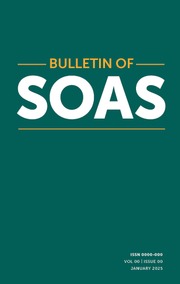This inspirational if somewhat problematic work is more a product of teaching and activism than of scholarship per se. It grew out of a training course held at the Center for Women's Global Leadership at Rutgers University in 1999 and organized in conjunction with the “Women living under Muslim laws” international solidarity network. The authors intend not to recount the life stories of famous Muslim women, but rather to focus more specifically on women who somehow fought for women's rights in Islamic contexts, which are broadly defined as “social environments in which Muslims constitute a dominant presence whether as a minority community, as part of a diaspora, or as inhabitants of a state in which the majority population is Muslim” (p. xi); one of their chief aims is to debunk the “dangerous myth” that the championing of women's rights is a Western import (p. xi). They argue that strong feminist currents have always existed within Islamic cultures and religious practices. Feminism, in other words, is endemic to many Islamic societies, and need not be seen as an alien intrusion. In this underlying argument I think they are entirely correct.
Broad in its scope, the book surveys biographies of women from grand stretches of the Islamic world, from Nigeria to China, over roughly ten centuries. The first three chapters cover the eleventh through the eighteenth centuries, and four other chapters focus on women in the nineteenth and twentieth centuries, so the modern era predominates slightly. Unfortunately, few primary sources were consulted, and the authors acknowledge that they were limited to sources written in English and Urdu and available in Pakistan (p. xxviii). Moreover, the lack of meaningful original analysis within the individual biographies and their rather cursory contextualization mean that the book has breadth but not depth. Some biographical sketches rely on one or two sources from which the authors borrow heavily, reproducing the research contained therein without, in my opinion, adding much, if anything, to the analytical framework. One egregious example occurs at the opening of chapter 3 (pp. 37–9), where the authors convey in rather too much detail the content of a piece by Carl Petry, “Conjugal rights versus class prerogatives: a divorce case in Mamlūk Cairo”, in Gavin R.G. Hambly (ed.), Women in the Medieval Islamic World (Basingstoke, 1999), 227–40.
While it is admirable, and indeed refreshing, to cover such a range of Islamic societies in one volume and to have an inclusive approach towards non-Muslims living within or alongside “Islamic contexts”, a precedent set by The Encyclopedia of Women in Islamic Cultures (EWIC) project, in some cases the basis for inclusion needs elucidation. For example, the authors discuss the 1929 “Women's War” in Nigeria (pp. 113–8), a revolt which was sparked by one woman's refusal to co-operate with colonial census officials. The tactics employed in this rebellion were informed by the local tradition of collective action known as “sitting on husbands”, and as such the incident serves as an intriguing example of women's activism – readers eager to learn more about it may wish to consult chapter 9 of Susan Martin's Palm Oil and Protest (Cambridge, 1988). However, nowhere in their discussion of the event do the authors of Great Ancestors contemplate the relevance of this particular feminist action to an Islamic community. Since this rebellion occurred among the Igbo women of southern Nigeria, and since no references to any Islamic practices or to Muslims are made in the account, some explanation is necessary as to why this event is cited as an instance of women claiming rights in a “Muslim context”. Furthermore, just as the “Muslim context” occasionally eludes the reader, a similar problem pertaining to what constitutes fighting for women's rights besets some of the biographical sketches. Regarding the eleventh-century Cordovan princess Wallāda Bint al-Mustakfī, we are told that her poetry “exhibits passion and sensuality” and that she herself “associated freely with artists and intellectuals” (p. 21). To view these activities as expressions of feminist action requires that one make certain potentially ill-founded assumptions about the society in which she lived and its literary traditions.
The authors’ omission of close relatives of the Prophet Muhammad is unfortunate. They explain this reluctant decision in the introductory essay as one which was motivated by a desire not to alienate students on the module by presenting them with contested biographies; they give the example of Sukayna Bint al-Ḥusayn, whom some believe to have been martyred at Karbala, and others to have survived (p. xxvi). However, it is precisely those women whose biographies are controversial – whose biographies took on lives of their own in religious and historical discourse – who perhaps have the most to contribute to the discussion of women's rights in Islam, because they continue to shape discourse on the topic. How strange it seems for a book like this to ignore the Prophet's daughter Fāṭima and the eloquent speech she delivered when Abū Bakr denied her her inheritance at Fadak. The versions of that speech transmitted by various authorities and found in Ibn Abī Ṭāhir Ṭayfūr's Balāghāt al-Nisā’ (Cairo, 1908), pp. 16–23, attest to the rhetorical skill and passionate intensity with which she argued her case.
Despite these weaknesses, Great Ancestors may prove to be a useful tool to teachers who wish to introduce their students to women's issues in an Islamic studies context. The authors engage extensively with many of the classic secondary sources in English, such as Leila Ahmed's Women and Gender in Islam and Fatima Mernissi's Forgotten Queens of Islam as well as with many lesser-known but equally enriching pieces of scholarship on a diverse array of Islamic cultures. In this sense it provides a decent initiation into the subject matter. Moreover, the introductory analytical essay, “Women, defiance, and Muslim contexts” (pp. xi–xxxvii), frames the debate over women's rights explicitly and accessibly.


